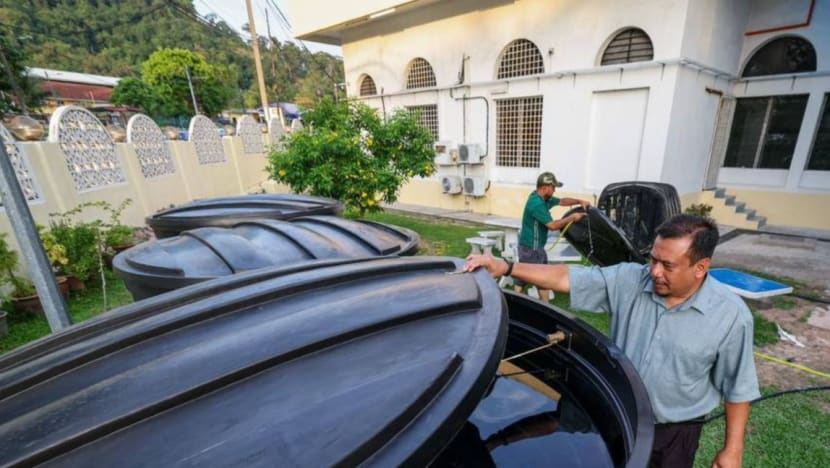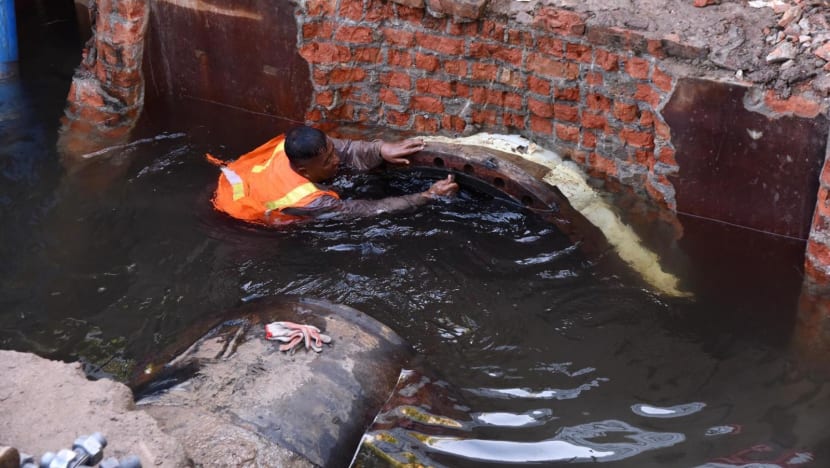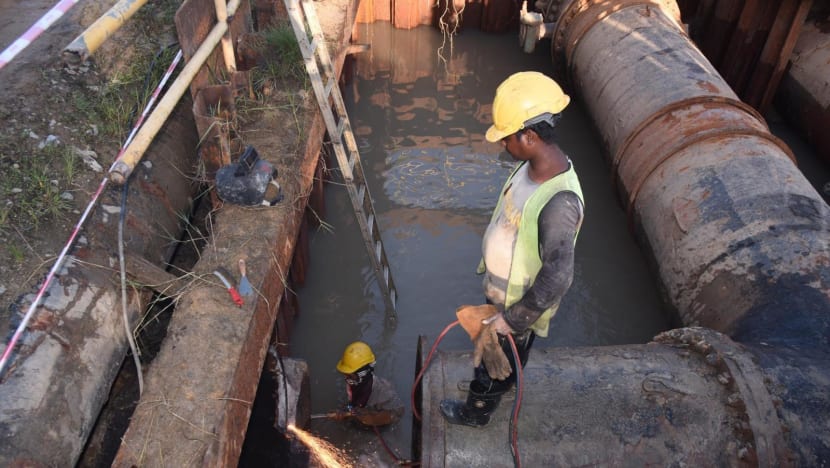Penang’s four-day water shutdown puts pressure on chief minister as locals air complaints over inconvenience, losses
An expert says that while the current situation may be an inconvenience to many, the high repair costs and long-term water loss would be a worse consequence if the faulty pipes were left unrepaired.


This audio is generated by an AI tool.
SINGAPORE: Locals and businesses in Malaysia’s Penang state are raising concerns over a four-day water supply shutdown from Wednesday (Jan 10) for maintenance, in what its embattled Chief Minister Chow Kon Yeow calls “the biggest challenge” of his stint so far.
The repair operation of the state’s water supply system, which will affect some 590,000 water consumers or over 80 per cent of Penang’s population - will make way for the replacement of two faulty 1,200-millimeter valves at the Sungai Dua Water Treatment Plant (WTP) in Butterworth.
“This is a major maintenance operation which needs to be carried out. Some of these parts have not been replaced for 50 years and need immediate replacement, said State Infrastructure Committee chairman Zairil Khir Johari on Dec 8, according to the New Straits Times.
"They were supposed to have been replaced one to two years back but we could not find the right time to do so.”
He added that the repairs will take a day, after which the water supply will gradually be restored and returned to normal after 48 to 96 hours.
Penangites who spoke to CNA said that they will be making changes to their daily routine to reduce water usage during this period, adding that the one-month notice provided by the government was helpful in the preparation plans.
Economist Dr Lean Hooi Hooi from Universiti Sains Malaysia (USM) told CNA that while the current situation may be an inconvenience to many, the high repair costs and long-term water loss would be a worse consequence if the faulty pipes were left unrepaired.
“That’s why in general, most people still support this water shutdown,” she said.
“(There is a) hope that this sacrifice for a few days (without water) will improve the water supply infrastructure so that in 50 years, there won't be any major water interruptions anymore.”


EFFORTS TO STORE AND SAVE WATER
In the days leading up to the water shutdown, Penangites shared images of water-filled containers on social media.
“As a resident affected by this water disruption, I have … (stored) as much water as I can within the limited space of my single-storey terrace house,” said a netizen when asked by CNA on the measures that they are taking to ensure a sufficient supply of water.
Meanwhile, Mr Joel, who lives in George Town, told CNA that he has taken to storing tap water and stocking up on drinking water.
“We will (also) be eating out more at eateries which are open … and (will) pile up our dirty laundries for later,” said the 50-year-old teacher.
A representative from local cafe Halzan noted that many affected people will likely choose to dine out to conserve water.
“We see this as a business opportunity as a lot of households might choose to dine in or take away food, rather than cook at home,” they said.
The cafe operates under a hotel and the representative estimates the hotel’s water storage can sustain the cafe’s business operations for up to two days.
“We have also set aside some water for personal use and (hope that it will be) sufficient to help us get through this period,” they added. “Worse comes to worst, we will serve (our food and drinks) using paper plates and paper cups to reduce the water consumption.”
Some businesses and schools have also instructed their workers and students not to come in during the water shutdown.
Ms Angela - a 37-year-old marketing executive who resides in Penang - told CNA that while her housing estate will not be affected by the water shutdown, her and her husband’s workplaces, as well as their children’s schools, are in the affected areas.
“We have been asked to work and study from home but I am glad that this decision was made as I would prefer the kids to be home … as (our home) isn’t affected by the water shutdown,” she said.
PRESSURE ON PIPES AND PENANG’S CHIEF MINISTER
The chief minister had previously mentioned that the shutdown could be considered a state “emergency situation.” However, he stated that as the pipes were at constant risk of rupture due to high water pressure he wasn’t prepared to avoid action.
“I could have closed my eyes and left it to a future candidate for chief minister to resolve the problem,” Mr Chow said to Free Malaysia Today. “But as leader of the state government and chairman of the Penang Water Supply Company (PBAPP), it is necessary for me to do this to prevent more severe losses for the people.”
The operation will likely further increase pressure on Mr Chow in his tenure as chief minister, which came under scrutiny in October last year following a public feud between him and his predecessor Mr Lim Guan Eng.
Earlier this month, Mr Lim criticised PBAPP’s chief executive officer K Pathmanathan for placing the onus on residents to store water. A leaked video clip showed Mr Lim calling for more public water tankers to be placed in areas most severely affected by the shutdown.
Mr Chow is a member of the Democratic Action Party (DAP), which Mr Lim is the chairman of. DAP, a Chinese-dominated party, is one of the component parties under the Pakatan Harapan coalition (PH).
Dr Oh Ei Sun, a senior fellow with the Singapore Institute of International Affairs, told CNA that Mr Chow’s position as chief minister may be “further weakened by some in (his party) who are keen to replace him, using the water shortage issue as a stick”.
ONE MONTH WARNING GIVES TIME TO PREPARE
Several Penang locals said they appreciated the one-month notice given by the state government on the water shutdown.
Ms Angela said that “it was reassuring that (the water supply company) managed to inform the public ahead of time regarding this so the public can make any necessary arrangements”.
She added that she is confident that PBAPP can manage the situation and resolve it within the predicted time frame.
“At least, this (time around), we all are given enough notice and we can plan and get ready for (the water shutdown),” said another netizen in response to a CNA query.
According to local media, a sudden water supply disruption occurred for four days last month in Penang after a major pipe burst under the Perai riverbed. The disruption affected around 200, 000 consumers in the island’s southwest district and Seberang Perai in one day, according to the Malay Mail.
Economist Dr Lean noted that while businesses will undoubtedly be affected by the water supply disruption, the one-month notice period is sufficient to make plans.
“(The impact of the water shutdown) varies between the different types of industries and types of businesses but I think that they are all well prepared.
“Some businesses will prepare by storing the water (to) carry on with the usual activities, (while) some, especially small family businesses, will take this opportunity … to close shop for a few days and go on vacation,” said Dr Lean.
“The time frame of about one month was given, so it should be enough for all the firms and businesses to prepare for this.”
She added that the financial repercussions on businesses and the government would be worse if the leaky valves were left unrepaired.
“If the pipes suddenly burst, immediate action will need to be taken. If PBA needs to buy the raw material (for repair works) immediately, the supplier will charge them a higher cost.
“And for businesses, (if the water suddenly stops) while they are doing the production, the whole batch of the product could be affected and cannot be used or sold. That will be even worse,” Dr Lean told CNA.
WATER STORAGE COULD WASTE RESOURCES
With the high usage of plastic containers to store water during the water shutdown, Dr Lean raised concerns over what will be done with the plastic containers once the water shutdown is over.
“For the households it’s still okay since they can just keep the containers in the house. But (what will happen to) those big containers (used by) the government … to store up to one gallon or two gallons for the people to use? These are funded by the government but it is indirectly the taxpayers’ money,” she said.
Mr Joel also said that while he appreciated the state government’s proactive effort to repair the valve before it breaks down, he felt that the preparations had come at an inconvenient expense to the public.
“Early notice, water trucks and water tanks are only the bare minimum. The economic losses … not (to) mention the monetary investment in water pails should be avoided,” he told CNA.
“What’s half of Penang going to do with all the water pails when this is all over?”
Separately, Dr Lean also noted that a waste of resources could occur if the maintenance works finishes earlier than planned.
“If the water supply resumes in two or three days, there may be an overstorage of water. I’m worried that this is a waste of resources.
“What can you do with the balance of the water that is already stored? If you just throw it out, then it's also a cost to the people,” she said.
Moving forward, Dr Lean said that PBA should use this incident as an opportunity to consider how they can use new technology to help them find pipes that are at risk of bursting.
“Rather than waiting for a pipe to burst, they should be able to detect where it is,” she said.



















